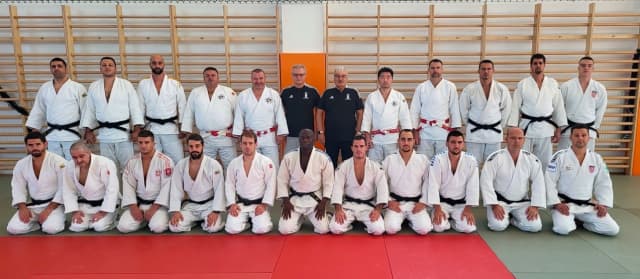At the beginning of this year, many federations sent their applications for the UCJI programme. A total of 400 students began their online studies and were working to be ready for their practical assessment week, to qualify.
The practical sessions consist of a one-week revision of nage-no-kata and the 100 Kodokan judo techniques. It has been surprising to see how many of the students have never studied naga-no-kata and are also new to many of the 100 techniques and the alphabet of judo, but a motto of the IJF Academy is, ‘we are here to help you pass, not to find a way to fail you.’
After more than 90 practical sessions in 2013, when the IJF Academy was established, the Academy experts gained experience with presenting the programme in an organised and friendly way.
In 2022 we had to catch up with all the weeks lost during the pandemic and provide practical sessions for the newcomers. Two experts were dedicated to following the small groups spread around the African continent, those nations who could not afford to travel to centralised locations. Practical sessions were organised in Cameroon, Benin and Niger for their coaches and for their close neighbours. Then, as Istanbul is very well connected to the African continent and the rest of the world, two weeks were organised in Turkiye. We must thank the Turkish Judo Federation for the excellent organisation, under the leadership of their President, Sezer Huysuz and his staff.
There was also much appreciated support for five federations, obtained through Olympic Solidarity from their National Olympic Committees: Great Britain, Spain, Hungary, Japan and Turkiye. This vital funding is granted to those National Olympic Committees who are prepared to organise a regional course for their coaches and other nearby NOCs.
Great Britain
The British Judo Association volunteered to organise one of these practical weeks in Walsall, England, where they have their Olympic and Paralympic training centre. In August this year 24 British students qualified, alongside two from Japan, two from Slovenia, two from Ireland, and one each from Argentina, Bahrain, Burkina Faso and Estonia. Among this group, we were proud to include multiple Olympic, world and continental medallists, most prominently 3-time world champion Masahi Ebinuma (JPN).
The British high-performance centre is located within the campus of the University of Wolverhampton. The IJF Academy has initiated the process of establishing longer term co-operation between the two organisations.
As well as the highly qualified staff of the British Judo Association, President Rowena Birch, Chairman Ronnie Saez, and CEO Andrew Scoular attended and followed many of the training sessions.
Spain
Following the British course there was an immediate turnaround, with the Academy travelling to Madrid. Sport Director Sara Alvarez was the co-ordinator for this week of practical sessions, staged at the National Judo Centre. Participants came not only from Spain but also from Columbia, Serbia and Iceland.
Dunavarsány, Hungary
Straight from Madrid, the IJF Academy moved on and arrived at the Olympic centre in Hungary. This centre is well known to the Academy as it alternated with the Tata Olympic Centre during the first years of Academy activity. The centre is close to Budapest’s international airport and has been refurbished recently with a state-of-the-art air-conditioned multi-purpose hall, sports accommodation, and restaurant. Additionally, the centre has a new swimming pool, fitness centre, sauna, and athletic track. Importantly, the fees for the use of this very competitive facility were negotiated favourably and this, combined with the readiness of the management to assist, brought a welcome harmony.
Working together with the professional support of the Hungarian Judo Association, we found a successful formula for all education sessions. Participants came not only from Hungary but also from Croatia, Serbia, Slovenia and Senegal.
The IJF Academy will close this year with another tour of four practical education and exam weeks, beginning with one week at the Kodokan in Tokyo, then two weeks back-to-back in Istanbul, Turkiye and a final week in Dunavarsány in December. The Tokyo week is fully booked but we still have some places in Istanbul and Hungary. Eligible students are encouraged to register early to avoid disappointment.
Author: Envic Galea, Chair of the IJF Academy




